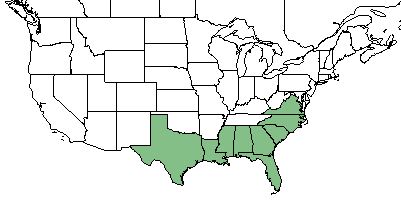Rhynchospora debilis
| Rhynchospora debilis | |
|---|---|
Error creating thumbnail: Unable to save thumbnail to destination
| |
| Photo by Bobby Hattaway hosted at Discoverlife.org | |
| Scientific classification | |
| Kingdom: | Plantae |
| Division: | Magnoliophyta - Flowering plants |
| Class: | Liliopsida – Monocotyledons |
| Order: | Poales |
| Family: | Cyperales |
| Genus: | Rhynchospora |
| Species: | R. debilis |
| Binomial name | |
| Rhynchospora debilis Gale | |

| |
| Natural range of Rhynchospora debilis from USDA NRCS Plants Database. | |
Contents
Taxonomic Notes
Synonym: none
Variety: none
Description
R. debilis is a perennial graminoid of the Cyperaceae family that is native to North America.[1]
Distribution
R. debilis is typically found in southeastern United States; specifically in Florida, Georgia, South Carolina, North Carolina, Virginia, Alabama, Mississippi, Louisiana, and Texas.[1]
Ecology
Habitat
R. debilis has been found in sandy alluviums bordering marshes, savannas, hillside bogs, pine flatwoods, and sandhill seeps.[2][3] It is also found in disturbed areas including logged pine flatwoods, new pine plantations, trail edges, and logging roads.[3]
Associated species: Scirpus cyperinus, Xyris caroliniana, Schizachyrium tenerum, Rhynchospora chapmanii, R. oligantha, Morella inodora, Eupatorium rotundifolium, Hypericum setosum, Sarracenia purpurea, S. flava, Eriocaulon decangulare, Lachnanthes caroliniana, Ctenium aromaticum, Rhexia lutea, Pluchea rosa, Polygala cruciata, P. lutea, Veratrum virginicum, Rhexia lutea, Scleria muehlenbergii, Sarracenia minor, Marshallia graminifolia, Magnolia virginiana, Pinus palustris, P. serotina, Quercus hemisphaerica, Q. elliottii, Coleataenia anceps, Ilex glabra, and Quercus velutina.[4]
Phenology
R. debilis has been observed to flower in June.[5]
Fire ecology
Populations of Rhynchospora debilis have been known to persist through repeated annual burning.[6]
Conservation, cultivation, and restoration
Cultural use
Photo Gallery
References and notes
- ↑ 1.0 1.1 USDA Plant Database
- ↑ Weakley, A. S. (2015). Flora of the Southern and Mid-Atlantic States. Chapel Hill, NC, University of North Carolina Herbarium.
- ↑ 3.0 3.1 Florida State University Herbarium Database. URL: http://herbarium.bio.fsu.edu. Last accessed: June 2021. Collectors: Loran C. Anderson, Angus Gholson, Robert K. Godfrey, Karen MacClendon, and Travis MacClendon. States and counties: Florida: Calhoun, Duval, Gulf, Jefferson, Wakulla, and Walton.
- ↑ University of South Carolina, A. C. Moore Herbarium accessed using Southeastern Regional Network of Expertise and Collections (SERNEC) data portal. URL: http://sernecportal.org/portal/collections/index.php Last accessed: June 2021. Collectors: John Nelson and Richard Porcher. States and Counties: South Carolina: Berkeley and Georgetown.
- ↑ Nelson, G. PanFlora: Plant data for the eastern United States with emphasis on the Southeastern Coastal Plains, Florida, and the Florida Panhandle. www.gilnelson.com/PanFlora/ Accessed: 29 MAY 2018
- ↑ Platt, W.J., R. Carter, G. Nelson, W. Baker, S. Hermann, J. Kane, L. Anderson, M. Smith, K. Robertson. 2021. Unpublished species list of Wade Tract old-growth longleaf pine savanna, Thomasville, Georgia.